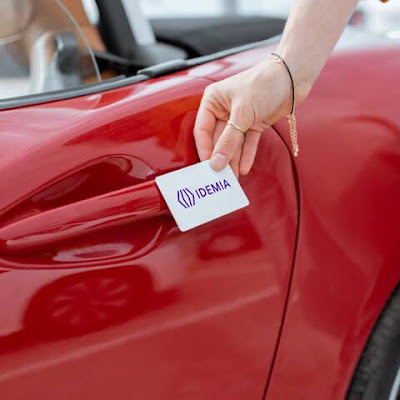
In the ever-evolving landscape of automotive technology, convenience and security are at the forefront of innovation. One of the latest breakthroughs reshaping the driving experience is the integration of card access systems—a modern solution that is gradually replacing traditional car keys and even smartphone-based entry systems.
Image Source: idemia
What Is Card Access in Automotives?
Card access systems involve the use of a smart card—similar in appearance to a credit or hotel key card—to unlock, start, and sometimes even drive a vehicle. These cards typically use near-field communication (NFC), radio-frequency identification (RFID), or ultra-wideband (UWB) technologies to communicate with the car’s onboard systems.
Key Features and Benefits
1. Enhanced Security:
Smart cards are encrypted and can be uniquely programmed, making them extremely difficult to duplicate or hack. In contrast to traditional keys or FOBs, they can include biometric authentication and time-sensitive access.
2. User Convenience:
Much thinner and lighter than a traditional key fob, a smart card can fit easily in a wallet or phone case. It also allows for keyless entry and engine start, streamlining the user experience.
3. Custom User Profiles:
Smart cards can store user preferences for seat position, climate control, infotainment settings, and driving modes. Once the card is used to access the vehicle, it automatically adjusts everything to the user’s preferences.
4. Fleet Management Applications:
For car rental services or corporate fleets, card-based access provides an efficient way to manage driver permissions without the need to hand over physical keys. Temporary access can be granted and revoked instantly via backend software.
Industry Adoption and Innovation
Luxury car manufacturers such as Tesla, BMW, and Mercedes-Benz have pioneered the use of card keys. Tesla’s Model 3, for instance, comes with an NFC-enabled key card that offers a sleek alternative to the smartphone app and standard key fob.
Meanwhile, startups and tech companies are exploring multi-use smart cards that can also be used for building access, public transport, and other functions—making the car access card a multifunctional digital ID.
Potential Challenges
Despite its promise, card access technology is not without challenges:
-
Loss or Theft: A lost card can pose security risks, although this can be mitigated with PINs or biometric backups.
-
Dependency on Power and Connectivity: Some systems require minimal power or active connections, which could be affected by battery failure or signal interference.
The Road Ahead
As automakers push toward fully digital ecosystems, card access systems are expected to integrate seamlessly with mobile apps and cloud services. Innovations in quantum encryption, block chain, and IoT could further enhance the security and functionality of these systems

